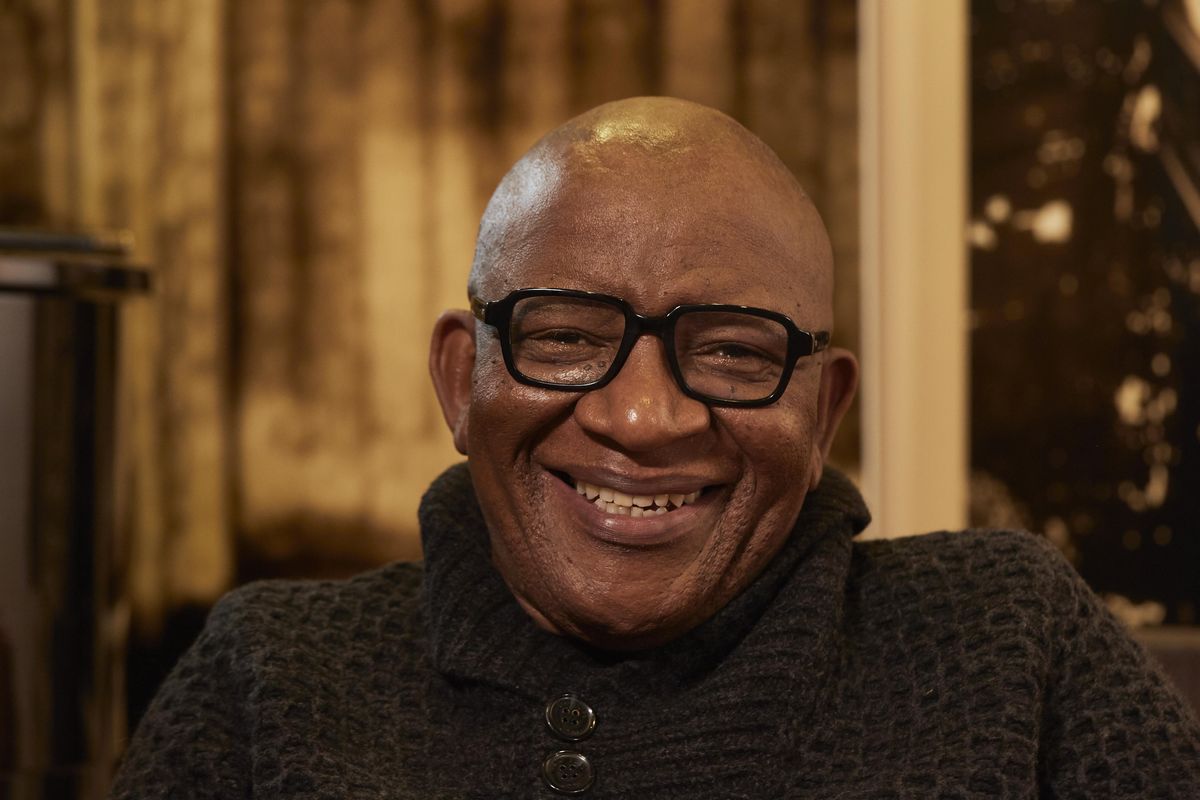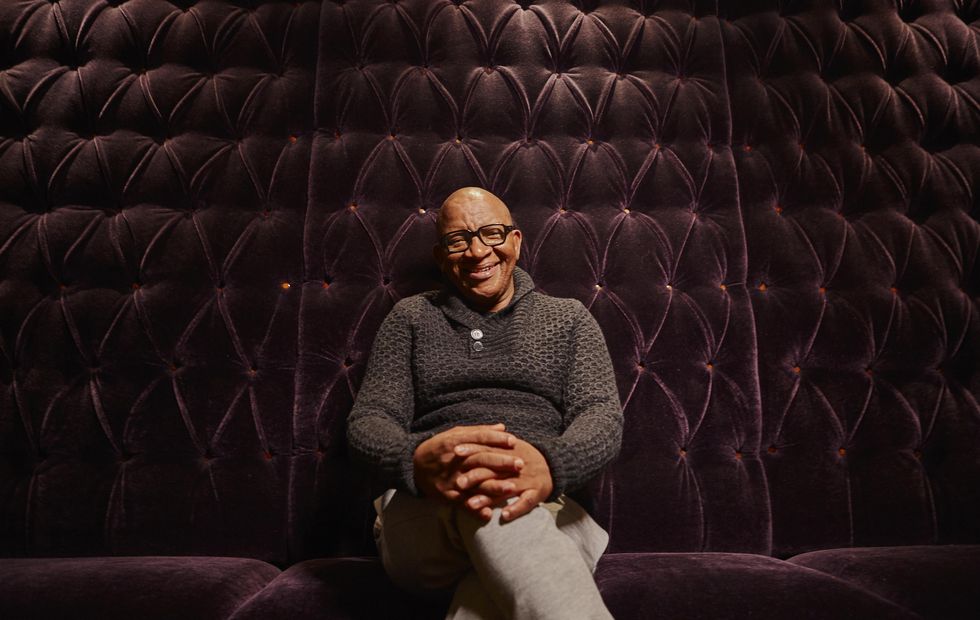Lebo M on 25 years of 'The Lion King' on Broadway
As Disney's global success reaches a new milestone, the composer and singer reflects on the impact the cultural juggernaut has had.

South African composer Lebo M celebrates 25 years of The Lion King on Broadway
Disney's The Lion King debuted on New York City's Broadway stage almost 30 years ago, and the African spirit and fire within the phenomenon continues to burn bright. Dubbed "The voice and spirit of The Lion King" by Disney, Grammy award-winning South African composer, and producer Lebo M traveled back to New York City's New Amsterdam Theatre to reminisce on the journey his talent and life experiences have taken him on.
"Nants ingonyama bagithi Baba!" His iconic chant introduced us to the world of Pride Rock and is arguably one of the most easily recognizable Disney lyrics to date -- even though half of the participants probably don't know what they're saying. Our conversation with the star revealed that he owes much of his early success to a case of being in the right place at the right time. Initially a coffee runner at Los Angeles's Hilton Studio, Morake was introduced to the late South African legend Johnny Clegg and fellow Lion King composer Hans Zimmer, ultimately leading to his being recruited to co-write and co-compose his first film The Power of One. This relationship with Zimmer led to the opportunity to join the Disney franchise, and the rest, as they say, is history.
We spoke with the South African great on the reality of the American entertainment industry, and how Black and African people need to better invest in themselves.
Responses have been edited for length and clarity.

25 years of The Lion King on Broadway – can you take us back to the opening night?
Opening night was a bit crazy, none of us had any idea if we’d survive a year on Broadway – it was a very difficult, competitive time. We had just spent a little over eight months in Minneapolis, Minnesota preparing [for New York City]. I played composer, arranger, and cast member – it was crazy! But, I’m grateful for all those experiences because one had to learn the show from being on stage, seeing the audience's reaction, and from the talent around me. I think that helped me figure out ways to sustain talent. I didn't know that we're going to have to live with the idea that we might do two years, five years, 6, 10, 12, 15, 20, now 25. And that means keeping the show fresh.
My main responsibility is keeping the voices of the show fresh, particularly the spirit of the show, which is a predominantly South African cast. I had to figure out ways as a result of that experience of being on stage, how to sustain the show.
Can you describe your journey from singing in the Victoria Hotel in Lesotho at age 16 to composing and singing in one of Disney’s biggest films at 30, and now celebrating 25 years of brilliance?
Wow, the mention of Victoria Hotel takes me back. Before that, I was 14 and the youngest nightclub singer in South Africa – at the Pelican Club. Again, I'm very grateful for all those experiences because I didn't realize what I was learning, who I was surrounded by, and how valuable being at the Pelican would be for me in the future. The discipline of being surrounded by professionals at such a young age. But, Victoria Hotel in Lesotho became a new venture, like a hustle. I think Victoria Hotel instilled the hustle into me, while Pelican was the institution that grounded us, and taught me a lot.
I was in exile at the time, and refugees were getting a R30 stipend. That was not the game plan for us – that's when the negotiating skills entered. We negotiated with the hotel that they put a piano outside, and my friend Vernon and I would entertain. I guess, in retrospect, that was the beginning of hustle, planning, and strategy.
What were your expectations of New York City’s Broadway scene, and what has been the reality?
The expectation of America, period, was: heaven. For us South Africans and especially those of us in the arts. At the time, we were exposed to Ebony Magazine and very rich Black lives. For so long, the dream of being an artist was to go to America, get an Afro, get a gorgeous woman, and drive that Cadillac. That was America to me.
And then, I landed in a nightmare – New York in 1979 was nothing like this. Graffiti everywhere, it was filthy and violent. It was my worst nightmare, to be honest. But, growing up in Soweto, and being exiled to Lesotho at age 16 – I landed in a pretty miserable beginning of my heaven. One was already groomed to believe, "Okay, let's go. This is the reality. Let's pick up and go."
The Lion King is an American story about Africa, but what was it like to be one of the first to introduce the world to African narratives and voices?
That's a hard one because there's no one way of defining what it is or what it's like to have been a part of this journey because it came by default, it came through hustle. The first three years on Broadway were big. But, before we got to New York, we spent about two years negotiating with the union to have South Africans in The Lion King on Broadway. At that time, and maybe even now, unless you're American or you have a green card, you couldn't work on Broadway – they have very strict union standards. That was the first hurdle in making sure that The Lion King, the very first show, had South Africans in it. Failing, we wouldn't have the spirit and the energy that we needed that was transferred from the movie to the Broadway show.
But subsequently, 25 years later, we've hired more Africans and more South Africans than any production in history. One begins to now reflect and appreciate the journey, but a whole bunch of people behind the scenes were also responsible for supporting us.
Can you tell us more about what it means to you to be in a position to create opportunities for your fellow South Africans to perform on global stages?
I think I have a hard time balancing success and the perception of success. Yes, I'm very much aware that we have done an amazing job hiring people and changing people's lives. But, in the greater scheme of things, there's got to be more. I'm a dreamer, so there's no dream big enough. If I've done that, then another bigger dream is already in motion. I don't know how to reflect and say, "Wow, we've made it."
There's only one Lion King when there should be 200 of them around the world. We're not thinking about success because there's been one product that's African content for 25 years on Broadway, and that's The Lion King. But comparatively, there are over 100 products from so many different cultures and countries. And it is nice to be the first, the first this, the first that. But it's also a great challenge to say, “No, but there should be..." Sarafina! should be still running right now. Ipi ‘Tombi should still be running right now. There are so many other even Black American products that should be running right now. I can't relate to how does it feel? It doesn't feel like anything. It feels like there's work to be done. I think as Black people and Africans, we have become too entitled and too opportunistic. We are not in the business of investing real money to get real quality products on Broadway that can be sustainable.
We have to be able to say, "Okay, Wakanda's made it, Lion King has made it, how much money did it cost?" Because it takes money. Sometimes our talent is not enough. Everybody else's talent is not enough. But everybody else has investors. Everybody else has money, but real money. The Lion King didn't just happen. Black people, businesses, and politicians should be the engine behind making sure that Black products are produced like The Lion King and are sustained like The Lion King. Or any other product that should be on Broadway or in the movies.
Spend some money and really respect African content the way everybody else does. We can't just constantly say, "Why?" Who are we saying, "Why is everybody not seeing it?" Why are we not seeing it? Why are we not putting money that everybody else is putting [in] to sustain us?”
That's very true. If we don't invest in ourselves, how can we expect others to want to do that? What do you hope these 25 years will add to your legacy?
Well, I hope and pray that it will have a bigger impact or begin to have an impact on African businesses, African politicians, and Black people around the world. It is possible to sustain high-quality African content on any stage in the world if you put the money and put your brains behind it.


